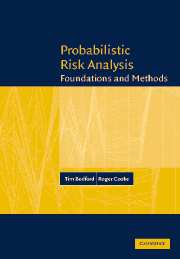Book contents
- Frontmatter
- Contents
- Illustrations
- Tables
- Preface
- Part I Introduction
- Part II Theoretical issues and background
- Part III System analysis and quantification
- 6 Fault and event trees
- 7 Fault trees – analysis
- 8 Dependent failures
- 9 Reliability data bases
- 10 Expert opinion
- 11 Human reliability
- 12 Software reliability
- Part IV Uncertainty modeling and risk measurement
- Bibliography
- Index
8 - Dependent failures
from Part III - System analysis and quantification
Published online by Cambridge University Press: 05 June 2012
- Frontmatter
- Contents
- Illustrations
- Tables
- Preface
- Part I Introduction
- Part II Theoretical issues and background
- Part III System analysis and quantification
- 6 Fault and event trees
- 7 Fault trees – analysis
- 8 Dependent failures
- 9 Reliability data bases
- 10 Expert opinion
- 11 Human reliability
- 12 Software reliability
- Part IV Uncertainty modeling and risk measurement
- Bibliography
- Index
Summary
Introduction
The subject of dependent failures is one of the more important issues affecting the credibility and validity of standard risk analysis methods; and it is an issue around which much confusion and misleading terminology exist. This treatment draws on procedures for dealing with common causes as issued by the US Nuclear Regulatory Commission, and the International Agency for Atomic Energy.
Component failure data versus incident reporting
Component data reliability banks typically collect individual component failure events and demands and/or operational times. From such data alone it is impossible to estimate the probabilities of dependent failures. For this we need information on the joint failures of components, which becomes available only when incidents involving multiple failures of components are recorded as such. Standard data banks do not collect data on incidents. There are, however, isolated exercises in incident reporting. There is also an ongoing program to analyze the so-called ‘licensee event reports’ in the American commercial nuclear power sector, and draw conclusions for probabilistic risk analysis. An issue of Reliability Engineering and System Safety (27, 1990) was devoted to ‘accident sequence precursor analysis’ and several contributions describe this program (see for example [Cooke and Goossens, 1990]). The use of incident reporting in probabilistic risk analysis deserves more attention than it has received to date, but will not be discussed further here. Recently an international common cause database for the nuclear sector has been established [Carlsson et al., 1998].
Information
- Type
- Chapter
- Information
- Probabilistic Risk AnalysisFoundations and Methods, pp. 140 - 152Publisher: Cambridge University PressPrint publication year: 2001
